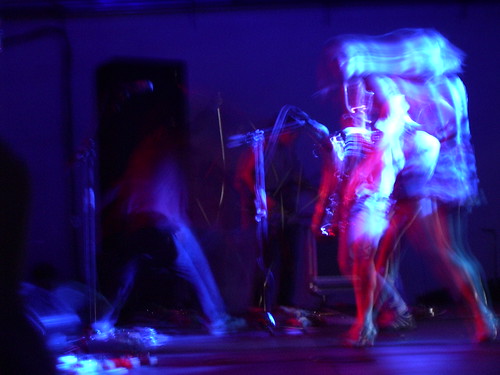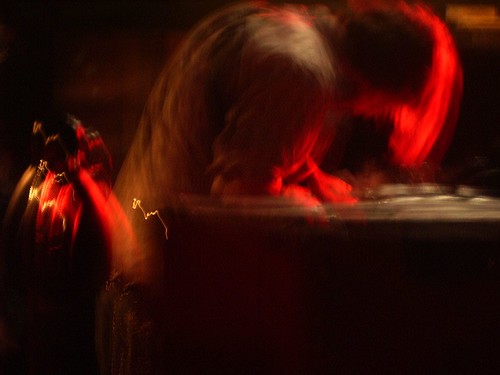
A Q&A WITH MICHAEL FRANTI
Michael Franti has been one of the most consistently insightful, incisive, and intelligent voices in politicised pop music for almost 15 years now. Starting with Beatnigs, who married spoken-word dialectics with fitful musical tantrums on tracks like ‘Burritos’, to his acclaimed work under the Disposable Heroes Of Hiphoprisy monicker, fusing Chuck D’s inciendary ire with Chomsky-esque media literacy to create the densest and most complete political record in pop history (1992’s Hypocrisy Is The Greatest Luxury), to his more ‘soulful’, relaxed, but no less radical records as Spearhead, Franti has presented a hardline liberal voice in a music industry ever more choked by big-business methods, and an America that’s never more than an international incident away from full on global fascism.
But Franti has never been the glum, humourless polemnicist some critics have characterises him as; amongst the tracts and protests that litter his records you can hear the honest voice of a fallible man questioning the (self?) righteousness of his actions, or glorying in the joy that is sometimes existence [for the former check the stunning ‘Music And Politics’ on Hypocrisy...; for the latter, ‘Nature’ off Beatnigs, or ‘Love Is Da Shit’ off Spearhead’s Home]; the vulnerability that propels the fierce intellect and sense of justice present elsewhere in his oeuvre.
Franti’s first album in four years, the ambitious Stay Human, mixes issues-led soul, hip-hop and reggae with a dramatic narrative based upon the unjust execution of a black activist. He spoke to us about the independence, the internet, and life under George Bush’s government.
SC: You recently parted company with Capitol Records, and have now set up your own Independent label, Boo Boo Wax, licensing your music across the globe...
MF: “I was gonna make another record for Capitol America, and a whole new regime came in there, as has happened at all the major labels over the last five years, and the new dude was like, ‘Well, we’d really like to have you work on a song with Will Smith...’ [incredulous pause]. I was, like, ‘You guys just don’t get it, you don’t see who I am at all’. So I asked to leave, and they didn’t want to let me leave, so I kinda just boycotted making a record, just kept recording on my own, and then ultimately they said, ‘We’d rather not have an unhappy artist around here’, so they let me go.
“Of all the 20,000 records that are released annually, only 0.2 % sell over 250,000 units. 0.2%! Then, 1.7% sell between 25,000 and 250,000. 2% of records sell over 25,000 units; all the rest sell under 25,000. And I thought to myself, God, I’ve been able to sell a couple hundred thousand units of each of my records, and yet I still don’t make a dent in the big scheme of things. That’s a lot of fucken records; if you’re selling them at $10 each, that’s a lot of money. And I’m not making any of that [laughs]! And I thought, Why don’t I just go and press up my own shit and see if I can get it sold. I’m just trying to be myself, speak from my heart and hopefully find those people who do like it, and hopefully make it available to them. The website, www.spearheadvibrations.com, was a key part of that plan. I don’t see the web as the ultimate delivery system for music, or the best technique, but it brings communities together, and brings like-minded people together, who enjoy music, lifestyles, political ideas, and can share them around the world with other people they don’t know.”
SC: The music industry has changed immeasurably over the past few years.
MF: “I still have a hard time when I see where pop music has gone today, music really takes a back seat to a lot of things; the stylising, the lunch pail, the doll, the book... The music is just the soundtrack to all that other stuff, and that’s where the internet, in some ways, is going to ultimately fail music. The merchandising is going to be more important than the music, and the music is going to be given away free, to suck kids into buying all that other crap. But, on the other hand, for artists who don’t have access to the mainstream media, its going to be the only way people around the world will be able to find out about music. I remember when I first came to the UK, you had Sounds, Record Mirror, Melody Maker, NME, all devoted to finding the new thing, the new cutting edge music. And now three of them have gone, and the last one is in a corner, desperate. The musical terrain has changed.”
SC: Is it a temporary or cyclical thing, do you think?
MF: “I think so. I hope so. I think at a certain point people are going to tire of just the whole pop thing, just like in the early 90s with Nirvana, people were sick of the heavy metal hair bands and wanted something more ‘authentic’. But I also think that the world, in terms of the globalisation of corporations, has really changed entertainment, because now they’re thinking, ‘well shit, do I really want to spend a bunch of money on some band that’s probably going to maybe sell a million at best, or should I dump my money into someone like Britney Spears, who’s maybe gonna sell 20 - 30 million units, AND have a movie, AND have a book, AND have T-Shirts and all that shit.’
“So what the major labels have done, is that they’ve gone out of the music industry and into the icon marketing industry, and they create these icons, they surround them with other stuff to buy that has the iconography of the artist on it. And so I think that that’s where one part of the music business is going to go to, just that iconography industry. Music will become less and less important.
SC: Don’t you think the marketing of Hip-Hop - artists like Wu Tang, Jay-Z and Puffy being similarly merchandised - is a part of this phenomenon?
MF: “I think that hip-hop has kinda led that, because before that we didn’t really have people focusing on personalities as much as you do now. Hip-hop is all about the personality of the artist, and artists marketing themselves and talking about themselves through their songs, and really creating the imagery that’s so powerful that people want to be a part of it. Rock music didn’t do that so much; it was about bands, and some times it was about Mick Jagger or Bono, the leader of the band, but it was about the band as a whole, the songs, and once MTV came in it was a lot easier to focus on one individual, rather than six guys you can’t really recognise. So I think hip-hop has led the way, and a lot of these people like Britney Spears and others have taken on the aesthetics and marketing of hip-hop. But not the content.”
SC: What made you concentrate on a single issue for this LP?
MF: “First of all, I chose two issues: one is the death penalty, which is the most obvious one.
“As a human being, we have the ability to create life or take life away. And I believe the truth is always there when we need it, and if we look into our hearts we know it’s wrong to kill our neighbour next to us, it’s wrong to kill people in war, that it’s absolutely wrong for the state to consider killing its own citizens, under any circumstances. Approaching this new government, it felt like this was an important issue for today, but there’s been no popular support against the death penalty, no artists willing to speak out about it, there’s been no movements to speak of, except for very small ones. I think its important for artsist to speak out against the death penalty, to begin to develop a concensus amongst other people that this is wrong.
“And that’s why I chose to take it on as a subject on this record, and the reason that I chose to tackle it the way I did, is that I didn’t want to write thirteen songs about the death penalty and people on death row. So I tried to create a narrative that would be seamless, engaging, and would also be stirring, moving, soulful and insightful, and would challenge people to think about the death penalty.
“In the booklet for the album I got quotes from a bunch of artists around the world who are willing to speak out against the death penalty. It’s interesting the people I got, I phoned lots and lots of artists and said, all you gotta do is leave a message on my answer machine and tell me why you’re against the death penalty. I would say about 80% of people I called didn’t call back.”
SC: That’s bizarre... Asides from the odd right-wing nutcase, the whole concept of the Death Penalty is pretty much entirely abhorrent to the
MF: “People in the
“We have to learn to not be reactionaries; we have to learn to be revolutionaries, people who in our times of reactivity can be mindful and look for the ultimate good in the situation, and find out how we can achieve it. And that’s challenging, it’s hard for people to do that, and politicians swoop down in peoples’ times of mourning and their times of hurt, and they prey upon them and use them for their own political gain. They’re very successful at doing that, and it’s hard for people to stop and remove themselves, because they’re always faced with those soundbite politics.
“There was this great example, there was this dude named Matthew Shepherd, a gay man in Wyoming who was taken out, brutally beaten and hung out on a fence post to die. He suffered for eighteen hours before he finally bled to death. They found the killers, tracked ‘em down and convicted them, and they asked Matthew’s parents if they wanted them executed. And they said, no. They said their son suffered and died, they didn’t want his death to cause any more death. And I thought that was a real incredible stand, for a bereaved parent to come out and say that was really inspiring.”
SC: There’s an interesting subplot in the narrative, with Woody Harrelson’s character campaigning for re-election and using the death penalty to silence dissenting voices.
MF: “That’s the other side of it, the other issue in there: the silencing of political voices in
SC: That’s one way in which the internet will be such an important tool in the future. It is, pretty much, unregulated airwaves, ‘free’ speech.
MF: “Yeah. But the way the establishment is trying to combat that is to buy up as much as they can of the avenues people use to access the internet. They’re not explicitly closing people off from information but, when you first sign on to AOL, you don’t wanna go anywhere else outside the little buttons on the browser that they tell you to click. There’s pictures of bikini clad women up there, saying, go here for news, go there to learn about this. It’s tunnel-visioning people, y’know. All the other stuff is gonna become really marginalised; the information is gonna be there, but no-one will know where it is or what to look for.
“It’s like with Napster; I remember first going to check out Napster and thinking, wow, I’ve got all the world’s music at my fingertips. But I still wish there’d be a radio station operating that could turn me on to some new shit. I don’t even know what I’m looking for, y’know? I’m spending a couple of minutes downloading a song, and I don’t even know if I’m gonna like it. I think that DJing is gonna become more and more important in the future. I don’t just mean DJing as in a guy behind two turntables, but somebody who is going to steer people to new music. And AOL is the ultimate DJ.”
SC: A very antiseptic, blinkered DJ.
MF: “Yeah. And they don’t spread love. Musical DJs are just there to spread love and share music in a communal setting. The idea of DJing in the media realm is going to become more important as more people get access to all the information in the world, they’re going to want to be guided to the right shit. There’s a billion websites out there, it supposed to double in the next year.”
SC: The release seems well-timed, what with the ‘Grand Executioner’ so recently taking up office in the White House.
MF: “Well I was digging the fact that for a couple of months we didn’t have a president; they were arguing about it in
“And they had these reports coming out that of course a lot of the elections were rigged, and black peoples’ votes weren’t counted. But still everybody on the news was saying ‘We’ve got to move on and accept Bush as the President’. FUCK that, that ’s prozac politics. Even in a sporting event, if something is in protest, they’ll replay the sporting event or make a ruling on it later saying this game was played under protest for further review, and once they come to that further review they’ll change their decision on it. With something as important as the Presidency, when we find that someone has used corrupt means to get into office, you don’t just say, ‘oh, well, you won’. You say, ‘you fuckin’ cheated and now you’re out’. I hope that the Bush presidency will just be a wake-up call to a lot of people, that a lot of the things we fought for for a long time in
SC: Who did you vote for?
MF “I voted for the Green Party and Ralph Nader. I went and heard him speak a couple of times, and of all the people running for office, this guy spoke closest to my own feelings. In
SC: I saw Jello
MF: “[the longest, hardest laugh you ever did hear]. Nah. I’ve got too many skeletons in my closet. I’ve taken too many drugs, participated in too many orgies to ever get elected in the
RECCOMENDED
Beatnigs, Beatnigs (1989, Alternative Tentacles)
A Little primitive sounding and difficult to adjust to now, and the version of Franti anthem ‘Television, The Drug Of The Nation’ is nowhere near as powerful as Hiphoprisy’s version. But ‘Burritos’ is hilarious, ‘Nature’ and ‘Malcolm X’ moving.
Disposable Heroes Of Hiphoprisy, Hypocrisy Is The Greatest Luxury (1992, 4th & Broadway)
U2 tour supports, cacophonic production from Consolidated’s Mark Pistel and live shows that saw Franti and co-conspirator Rono Tse chainsawing television sets sold Franti’s vision to white liberal rock fans. A decade later, it’s the slow-burning Gulf War nightmare of ‘Winter Of The Long Hot Summer’ and the introspective ‘Music & Politics’ that strike deepest.
Spearhead, Home (Capitol, 1994)
His intention was to make a record that wasn’t so hard on the ears, that could sit alongside the Stevie Wonder and Bob Marley records that drew him to music in the first place. ‘Crime To Be Broke In America’ added Gil Scott-Heron to that mix; ‘Positive’ was the Hiphoprisy-era AIDS track that best showcased his thoughtful downbeat lyricism; ‘Caught Without An Umbrella’ suggested the dark personal demons that bred Franti’s brand of humanistic politicism.
Spearhead, Chocolate Supahighway (Capitol, 1997)
The uneasy follow-up, a harder hip-hop production aiming Franti’s message away from the already-converted. The pro-ganja subtext gets cloying after a while, the joan Osborne collaboration shoud never have been allowed, the street-soul angle too often bland and under-inspired. But ‘Payroll (Stay Strong)’, ‘Gas Guage’, ‘Food For Tha Masses’ and ‘Why Oh Why’ nestle easily alongside Franti’s finest work. A curate’s egg, still worthy of your examination.
Michael Franti & Spearhead, Live At The Baobab (Boo Boo Wax, 2000)
Live set of Franti’s circa-2000 spoken word/stripped down band sets. Funny, sharp, uplifting, it recalls Curtis Mayfield’s indispensible ‘Live!’ LP from 1971 in its intimacy, and in the way Franti plays with the songs to accencuate the message and meaning behind them. Available from www.spearheadvibrations.com.




No comments:
Post a Comment